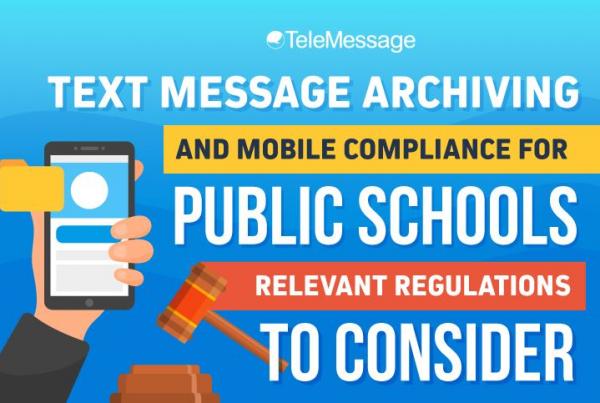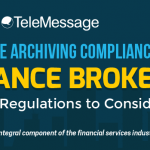In our previous post, we discussed that a no-texting policy is no longer sufficient to protect financial organizations from the increasingly stringent Financial Industry Regulatory Authority (FINRA) regulations. Non-compliance with its text message archiving and supervisory requirements regarding electronic communications can lead to significant fines and penalties.
To further understand the significance of complying with FINRA, we detail in this post the summary of the disciplinary actions taken by FINRA from January to June 2018. Note that these disciplinary actions were only levied against firms and individuals who violated the record keeping and supervisory requirements regarding electronic communications such as text messages.
1. Lightspeed Trading, LLC
FINRA censured and fined the New York-based firm for a total amount of $290,000 after it failed to establish a system of reasonable supervision, including Written Supervisory Procedures (WSPs), for the review of orders entered by firm customers, and also because it failed to maintain systems to detect potentially manipulative trading activity.
According to the findings, one of the supervisory requirements the firm failed to meet is the review of their representatives’ electronic communications. The financial industry watchdog stated that the firm should have been aware that a representative was using a “non-firm instant messaging account” to conduct the firm’s business.
Their failure to archive records of these conversations led the firm to inadequately make and preserve electronic business records, a supervisory deficiency which had the potential to adversely affect the integrity of markets and cause potential harm to other market participants.
2. Dakota Securities International, Inc. and Bruce Martin Zipper
FINRA filed a complaint against the Miami-based firm and one of its employee after the latter engaged in clerical and managerial activities while statutorily disqualified and suspended in all capacities by FINRA.
Aside from allowing a suspended member to engage in transactional, clerical, and managerial activities, the complaint further alleges that the firm failed to establish and maintain a supervisory system for review of electronic communications. One piece of evidence which further solidified the complaint against Zipper was that he sent numerous emails using the firm’s email system, and placed trades through the firm’s trading system under his representative code.
As a result, Zipper caused the firm to maintain inaccurate books and records, and the firm maintained inaccurate books and records in willful violation of Section 17(a) of the SEA of 1934 and Rule 17a-3 thereunder.
3. Frederick Alan Schwarb Jr.
A letter of Acceptance, Waiver and Consent (AWC) was issued in which Schwarb was assessed a deferred fine of $2,000 and suspended from association with any FINRA member in all capacities for 30 days. Schwarb allegedly sent an email from his personal email account to a prospective customer to evade detection, thus violating his member firm’s procedure of using firm-approved systems or devices.
In addition, Schwarb communicated with prospective customers via text message on his unauthorized personal mobile device. Schwarb’s business-related communications, sent from his personal email account and personal cell phone, were not retained by the firm, causing it to fail to comply with its recordkeeping obligations.
4. Brad C. Lawing
An AWC was issued in which Lawing was assessed a deferred fine of $10,000, suspended from association with any FINRA member in all capacities for five months and ordered to pay $11,754, plus interest, in deferred restitution to customers.
Among the FINRA regulations, Lawing’s non-compliant actions breached is the supervision of electronic communications. Lawing sent more than one hundred text messages about his securities business to the representative without seeking or receiving his member firm’s prior written approval. As a result, Lawing prevented the firm from supervising those communications, creating a risk of harm to customers.
5. GG Compass
An AWC was issued in which the New York-based firm was censured, fined $75,000, and required to submit a certification that its policies, systems and procedures, and training are reasonably designed with respect to the firm’s compliance with FINRA Rule 3310, and the requirements of the Bank Secrecy Act.
In addition to violating many regulations – such as the requirement to develop an AML program and implement a detection system for suspicious activity arising from wire transfers – FINRA determined that the firm failed to maintain evidence of principal review of its electronic correspondence.
6. Raymond James Financial Services, Inc.
FINRA fined the firm $2 million after it failed to maintain reasonably designed supervisory systems and procedures for reviewing email communications. FINRA found that during a nine-year review period, Raymond James’ email review system was flawed in significant respects, allowing millions of emails to evade meaningful review.
According to findings, the lexicons of the firm’s email review system were not reasonably designed to detect certain potential misconduct of the firm’s employees. The firm also failed to devote adequate personnel and resources to the team that reviewed emails flagged by the system, even as the number of emails increased over time.
7. James Wright
An AWC was issued in which Wright was fined $5,000 and suspended from association with any FINRA member in all capacities for 10 business days. This was after they found that Wright used unapproved personal emails and text messages to communicate with an unregistered administrative assistant regarding the member-firm customers.
According to the findings, Wright used his two personal email addresses and the text messaging function of his personal smartphone – neither of which are connected to his member firm’s archiving system nor approved by his firm – to transmit a text message to his assistant. As a result, Wright caused the firm to fail to capture, retain, and maintain records of his communications.
8. Matthew Evan Eckstein
FINRA filed a complaint against Eckstein after he allegedly sold over $1.3 million of “investments” that were neither described in any written materials nor memorialized in a note or other agreement.
In addition, the complaint alleges that Eckstein caused a different member firm to violate Rule 17a-4 of the Exchange Act and FINRA Rules 2010 and 4511 by failing to preserve customer emails, text messages, facsimiles and account summaries he created for and sent to individuals.
To avoid non-compliance with FINRA text messaging and corporate data archiving requirements, companies should invest in enterprise mobile messaging solutions that will allow them to retain and manage business text communications more efficiently.
The TeleMessage Mobile Archiver effectively addresses compliance, regulatory, eDiscovery response requirements and reduces risk across a variety of industries. TeleMessage captures mobile content, including SMS, MMS, Calls and Chats from corporate or BYOD mobile phones. Messages are securely and reliably retained within TeleMessage servers or forwarded to an archiving data storage vendor of your choice.
Our mobile archiving products securely capture content from mobile carriers and mobile devices for a variety of ownership models (BYOD, CYOD and employer-issued). With our three archiving methods, you can always find the right tools or blend for your requirements:
We are your one-stop shop for international, cross-carrier mobile text archiving. Contact us today by calling +1 (978) 263-1015.




